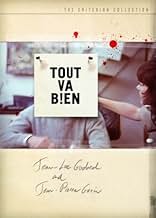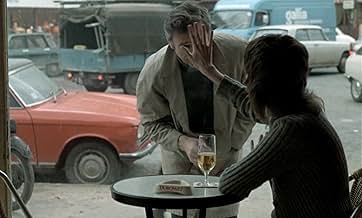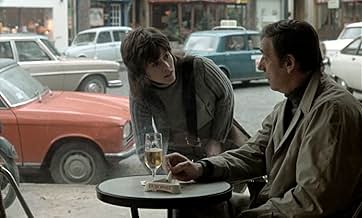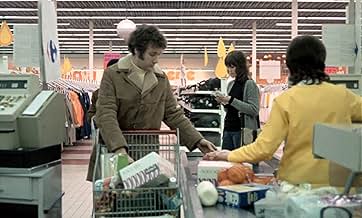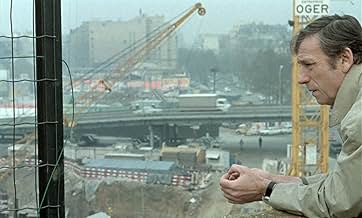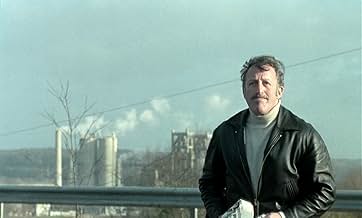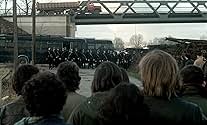IMDb-BEWERTUNG
6,5/10
4038
IHRE BEWERTUNG
Godard untersucht die Struktur von Filmen, Beziehungen und Revolutionen durch das Leben eines Paares in Paris.Godard untersucht die Struktur von Filmen, Beziehungen und Revolutionen durch das Leben eines Paares in Paris.Godard untersucht die Struktur von Filmen, Beziehungen und Revolutionen durch das Leben eines Paares in Paris.
- Regie
- Drehbuch
- Hauptbesetzung
- Auszeichnungen
- 1 wins total
Louis Bugette
- Georges
- (as Bugette)
Yves Gabrielli
- Léon
- (as Yves Gabrieli)
Empfohlene Bewertungen
The first film I see from Godard. Absolutely astonishing! Conversational and narrative experiments that I now see as the origins of my favorites from Hal Hartley.
Framed by the conversation of a wannabe filmmaker to his friend, where they develop an outline for a story, is a film about love and revolution. Yes, it's French. Questions raised: can love survive relationship? Can revolutionary thought survive revolution? Is it any good?
I don't know where it comes from, how it gets through, but one can sense much love for all the director's characters, for people and for film. Love and compassion.
The last fifteen minutes of the film are among the most beautiful moments I have witnessed in cinema.
Framed by the conversation of a wannabe filmmaker to his friend, where they develop an outline for a story, is a film about love and revolution. Yes, it's French. Questions raised: can love survive relationship? Can revolutionary thought survive revolution? Is it any good?
I don't know where it comes from, how it gets through, but one can sense much love for all the director's characters, for people and for film. Love and compassion.
The last fifteen minutes of the film are among the most beautiful moments I have witnessed in cinema.
After his four-year, self-imposed Maoist/nihilist "exile," Godard made a temporary -- albeit slight -- overture toward conventional commercial (or "bourgeois," as Godard called it) cinema by combining a leftist political essay with a dissection of human interaction. Alas, the film fails on both these levels; as a study of the male-female relationship, it is nowhere near "Contempt" and "Masculin-Feminin"; as a pure Maoist political tract, it is shallow and mind-numingly boring compared to "Le Gai Savior" and "Vladimir and Rosa." Nevertheless, "Tout va bien" is nonetheless important within Godard's extraordinary body of work, for it marked the beginning of the seven-year process in which his films would gradually shed their ultra-leftist leanings and move towards more universal, humanistic themes, a process that would ultimately cumulate in the excellent "Every Man For Himself." Even true Godard aficionados will be as bored as everyone else, but they should nonetheless go out of their way to secure a copy.
I've always found a kind of disconnect between the Godard films of the 60's and the Godard films of the 80's, 90's and today, which is that in the past twenty or so years Godard has kept on experimenting, not telling the usual stories that we're used to in movies, with impressive camera-work and aloof actors. But in these films he's also gotten rather boring with his material, and sometimes his experimenting goes a little over the edge for my taste. I had yet to see a work of his from the 70's, however, until Tout va Bien, or Everything is Fine (many of his films are either very limited or totally unavailable in the US). It's actually a good movie for him and co-writer/director Jean-Pierre Gorin. Gorin, unlike Godard, was not a big-time cinephile, but did have motivations to become a political filmmaker. What they concocted was a kind of response to the ways that political films are not made, and should or could be made, in the independent/art world of cinema. This time, as usual, Godard takes very long shots of people talking, and has a couple of his inventive, almost scarily calm tracking shots. But this time as well he has two international stars on his hands. This is where he and Gorin get creative more so.
It's a tale of the working class against the ruling class that gets one thinking during the film, and even after it. They place Jane Fonda and Yves Montand as a married couple who get locked in a bitter struggle between meat-factory workers and the management not giving them their proper due. Although Fonda and Montand are the 'stars' of the movie, right off the start of the film (including discussing narrating voices) the whole idea of what this film should be is dissected- the money involved, what the stars should be doing in this story, why should there even BE a story? In short, the film unfolds as the stars become more so observers than the main gig, and the non-professionals (at least I thought they were, they might've been character actors) became the real stars. There are a few monologues, long ones, that go on during this dispute, and they're inter cut with scenes where Godard and Going seem to be showing the double-edge to these workers- they're part determined to get their way, and partly like kids taking over the school.
After these scenes, we get mostly all scenes with the stars, as Montand plays a disaffected art-film-turned-commercial director, and Fonda plays an dissatisfied American reporter. Their dialog together sort of winds down the film (including more monologues), leading up to a scene in a supermarket that almost reaches to the heights of the sustained, overwhelming filmic anarchy of the traffic-jam in Godard's Week End. Then the film ends without much else to say. So, basically, Tout va Bien kept me interested with what the characters/actors/people had to say, and unlike in Godard's 80's films there was a structure. And I liked how the screen-time for the extras ended up being balanced out by that of Fonda and Montand.
The downsides, which there are a few, are that Fonda and Montand, up until their scenes together &/or their monologues, don't have much at all to do in the film. I can't criticize or comment too much on their acting, because they seem to be too natural (by way of Godard/Gorin's simplicity throughout, sometimes funny sometimes not) to be doing anything very powerful. And there were a few times the experimenting got annoying. But overall, Tout va Bien works on its own terms, and its the kind of film now on DVD can find its audience somehow. Whether or not the same audience that embraced with loving arms Breathless and My Life to Live will do the same with this is another matter- it's part frustrating, but part clarity all the same. At the least, it's not just Godard's doing whether or not the film works or not- Gorin deserves equal credit or berating. B+
It's a tale of the working class against the ruling class that gets one thinking during the film, and even after it. They place Jane Fonda and Yves Montand as a married couple who get locked in a bitter struggle between meat-factory workers and the management not giving them their proper due. Although Fonda and Montand are the 'stars' of the movie, right off the start of the film (including discussing narrating voices) the whole idea of what this film should be is dissected- the money involved, what the stars should be doing in this story, why should there even BE a story? In short, the film unfolds as the stars become more so observers than the main gig, and the non-professionals (at least I thought they were, they might've been character actors) became the real stars. There are a few monologues, long ones, that go on during this dispute, and they're inter cut with scenes where Godard and Going seem to be showing the double-edge to these workers- they're part determined to get their way, and partly like kids taking over the school.
After these scenes, we get mostly all scenes with the stars, as Montand plays a disaffected art-film-turned-commercial director, and Fonda plays an dissatisfied American reporter. Their dialog together sort of winds down the film (including more monologues), leading up to a scene in a supermarket that almost reaches to the heights of the sustained, overwhelming filmic anarchy of the traffic-jam in Godard's Week End. Then the film ends without much else to say. So, basically, Tout va Bien kept me interested with what the characters/actors/people had to say, and unlike in Godard's 80's films there was a structure. And I liked how the screen-time for the extras ended up being balanced out by that of Fonda and Montand.
The downsides, which there are a few, are that Fonda and Montand, up until their scenes together &/or their monologues, don't have much at all to do in the film. I can't criticize or comment too much on their acting, because they seem to be too natural (by way of Godard/Gorin's simplicity throughout, sometimes funny sometimes not) to be doing anything very powerful. And there were a few times the experimenting got annoying. But overall, Tout va Bien works on its own terms, and its the kind of film now on DVD can find its audience somehow. Whether or not the same audience that embraced with loving arms Breathless and My Life to Live will do the same with this is another matter- it's part frustrating, but part clarity all the same. At the least, it's not just Godard's doing whether or not the film works or not- Gorin deserves equal credit or berating. B+
Jean-Luc Godard's follow-up to the ultra-Maoist Weekend, featuring Yves Montand as a former New Wave filmmaker and his wife Jane Fonda, as they become active in a factory takeover. The film is of course very sympathetic to Marxism and perhaps Leninism, but it's certainly toned down from the blood fest that is Weekend, perhaps regrettably. Godard insists on reinterpreting and imposing entirely new ideas about what a film can and ought to be, in this case an intellectualized espousal of the working class struggle. A few moments of daring misce-en-scene are worth mentioning; fist, Godard includes an awesome cutaway of the factory to reveal the power-dynamics of the uprising within, and an elaborate tracking sequence in a supermarket to reveal the gross stupidity of capitalist consumerism. Tout Va Bien is clearly a step-down from Godard's brilliant features of the 60's, but it's still provocative and worth any cinephile's time.
Although I'm quite familiar with most of Jean-Luc Godard's career, there is that 1970s period where he completely abandoned commercialism in all its forms and made experimental political films with Jean-Pierre Gorin and others. Tout Va Bien is not an impossible work, but it is challenging and, even if you win that challenge, the rewards are fairly limited. But it's interesting work, and Godard's fractured cinematic imagination is definitely brilliant at times. The grocery store sequence near the end of the film is as cinematic ally accomplished and impressive as the tracking shot of the apocalyptic highway in Week-End. And I love the meta-cinematic material at the beginning, where the filmmakers discuss how they can make a political film about May '68 and how the movement has evolved in the following four years. Step on: hire some stars. With stars come money. Thus Yves Montand and Jane Fonda are recruited for that purpose. The longest segment of the film has the two stars trapped with the manager of a slaughterhouse as his workers bar him from leaving his office. Godard and Gorin have a set designed after that large-windowed apartment building in Tati's Playtime. Perhaps it is even the same exact set, remodeled a bit for the way they want to use it here? The new Criterion DVD includes a follow-up film, A Letter to Jane, which discusses the famous photograph of Fonda meeting with the Viet-Cong. It is nearly unwatchable, though, and I gave up after 15 or 20 minutes (it's 52 minutes of Godard and Gorin speechifying which is also prevalent (and hard to take) in Tout Va Bien, as well).
Wusstest du schon
- WissenswertesMost of the shots contain all the three colours of the French flag: blue, white and red.
- Zitate
Narrator: There'd be farmers who farm. Workers who work. And bourgeois who bourgeois.
- VerbindungenEdited into Bande-annonce de 'Tout va bien' (1972)
- SoundtracksIl y a du Soleil sur la France
Music by Eric Charden
Lyrics by Frank Thomas and Jean-Michel Rivat
Performed by Stone et Charden
Top-Auswahl
Melde dich zum Bewerten an und greife auf die Watchlist für personalisierte Empfehlungen zu.
- How long is All's Well?Powered by Alexa
Details
- Laufzeit1 Stunde 35 Minuten
- Sound-Mix
- Seitenverhältnis
- 1.66 : 1
Zu dieser Seite beitragen
Bearbeitung vorschlagen oder fehlenden Inhalt hinzufügen

Oberste Lücke
By what name was Alles in Butter (1972) officially released in Canada in English?
Antwort
